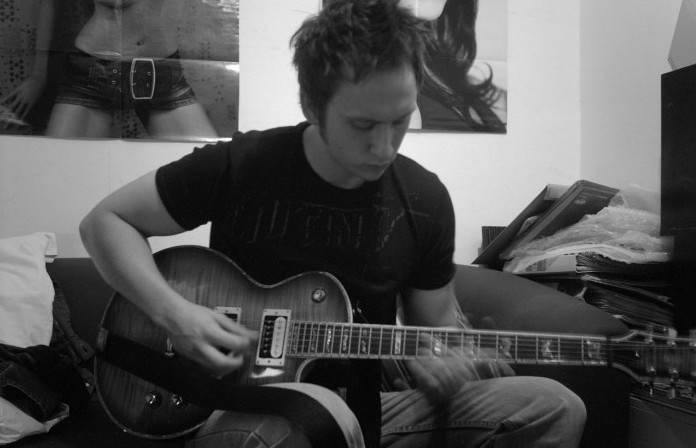System of a Down eat your heart out. This is the greatest contrast of styles I think I have seen so far. Twelve Foot Ninja and Coming Home.
Guitar lessons in Bournemouth, Poole and Christchurch
System of a Down eat your heart out. This is the greatest contrast of styles I think I have seen so far. Twelve Foot Ninja and Coming Home.
If there is one thing that you can do to greatly improve your playing ability then it is recording yourself. This is because usually we  have an inflated opinion of how good we are. I remember thinking I was a kick ass guitarist until the first time I made a video of myself playing.
have an inflated opinion of how good we are. I remember thinking I was a kick ass guitarist until the first time I made a video of myself playing.
Urghh
It was horrible. My string bends were all out of time and my rhythm was all over the place. Thanks a lot YouTube!
Looking back I don’t think I was THAT bad, just because I wasn’t accurately measuring my ability I had grown sloppy. You see the benefit of recording yourself is that you get an objective view of how good you are. When we are using our own ears to judge whilst we are playing it doesn’t give a true indication of how we sound.
A way to think of it is that it’s similar to how we look different in the mirror compared to how we think we look in photos. It’s still me but a different version of me.
This is what you should do. Using your webcam or any video recording device, just play along to a song of your choice and record it. Play it back and listen to how you sound. Locate the mistakes and then record yourself again.
Keep doing this until you have all the sloppy parts ironed out. As long as you can play the piece comfortably it shouldn’t take more than 5-10 attempts to iron out the mistakes.
If you record yourself a couple of times a week you will see a massive difference in how you sound. It will tighten up your rhythm and your accuracy and in just a few weeks you will be a completely different guitarist.
An added benefit is by uploading to YouTube, you can get impartial feedback from the whole world.
Why you should always jam with other musicians
Thinking back to when I first started playing all those years ago. My biggest regret was not finding other guitarists to jam with. Maybe I was insecure about my own ability, and didn’t want to embarrass myself in front of anybody, I don’t know. All I know is that the first 4/5 years I could count on one hand the amount of people that I had jammed with. I could count on two hands the amount of people I played in front of.
Playing and practising in isolation does two things. Firstly you get a false impression of your own ability. It’s easy to play for yourself, alone in your room away from prying eyes and ears. Nobody can criticise you or tell you something you don’t want to hear. So you end up believing you are better than you are. Secondly you miss out on one of the most important aspects of learning, of what being a musician is about, performance.
Think of all the gigs you have been to, the musicians you see on stage, on TV, in books and magazines. What is the one thing they all have in common? They all either play within a band or if solo, they still play in front of an audience.
If you have never played in a band context before, the first time is a rude awakening. You will find it hard to keep in time with the drummer, and you will find the other instruments pretty off putting. This will cause your playing to suffer and will raise anxiety levels resulting in frustration and a loss of enjoyment.
It doesn’t have to be like this though. The best way to make sure you never experience this is to practice jamming with someone. Just having a friend round with whom you can play with; will have a massive improvement in your timing, rhythm and overall enjoyment with your guitar playing.
Then when it comes to playing within a band, you will have the rhythm and timing skills to jump right in and play with increased confidence.
The important thing to remember, is when choosing someone make sure they are of similar ability or preferably better than you. We learn quicker when our comfort zone is challenged slightly, but not so much that we feel out of our depth.
This is one of the reasons why having a guitar teacher is so rewarding. Yes anyone can go on the internet and get some tabs and chord sheets, but having someone in front of you who can coach you and raise your playing level is a far better learning experience.
Where to find other musicians?
If you have trouble finding someone to jam with, then in the meantime it is a good idea to play along to backing tracks and cd’s. It’s obviously not as personal but you still get to experience professional quality musicians and this will help your rhythm playing if nothing else.
If there is one thing I want you to take away from this, is don’t leave it too late to start jamming. It is the most enjoyable part of being a guitarist and if you want to get good, then you have to do it sooner or later so it may as well be now.
by Jamflex

When most of us hear the word practice, we immediately feel a sense of dread. Images of Steve Vai’s infamous 12 hour workout regime spring to mind. The thing is, practicing doesn’t have to be a strict military operation, devoid of all fun and enjoyment. There is no point blindly following lessons from a book or from the internet with the mindset of, “well such and such did this every day and look at him. I have to do the same”.
Guitar playing is all about having fun. That’s it.
You have to enjoy what you are doing beyond anything else. The brain learns in two ways. They are repetition and novelty.
Repetition works by repeating a certain phrase, riff or exercise many times. As long as you are doing it correctly, the brains neural pathways will strengthen and develop. It will become memorised.
Novelty works by forcing the brain to pay attention to new stimuli. This can be learning new songs, listening to new music or playing with different people.
So what is the best way to schedule your practice sessions?
It is almost always best to write out beforehand what you plan to do. Plan out the time of your session and divide it between the various aspects of technique and theory that you want to learn. For example, say you wanted to practice for 2 hours. You may divide it up like this.
15 minutes – warm up
30 minutes – learn some new chords
15 minutes – practice the riff to Sweet Child O’Mine
Have a break
15 minutes – Play through the pentatonic scale
30 minutes – Focusing on strumming, maybe by playing a song
15 minutes – Play along to a song and try to figure out a riff or melody
This is just an example off the top of my head. Now, the important part of any practice schedule is to focus for a short period of time, say 1 hour. Then have a break. I also suggest spending only 15-30 minutes on one area as in my experience the brain starts to get a little bored if you spend too long on something.
If you wanted to spend 30 minutes on a technique, and you find that after 15 minutes your mind is starting to wander and you feel bored and restless. Then stop and do something else, or take a short break. If you aren’t paying attention, your learning ability is going to diminish. Also if your mind starts to wander, it is a good sign you aren’t enjoying it so choose something you know you will find fun.
Remember with practicing. It is always quality over quantity. Whatever you are learning, make sure it is fun and you will progress a lot quicker.